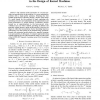367 search results - page 29 / 74 » Multi-Core Design Automation Challenges |
159
click to vote
IJCNN
2007
IEEE
15 years 8 months ago
2007
IEEE
Abstract— The optimal model parameters of a kernel machine are typically given by the solution of a convex optimisation problem with a single global optimum. Obtaining the best p...
112
click to vote
CHI
2005
ACM
15 years 4 months ago
2005
ACM
HIPs, or Human Interactive Proofs, are challenges meant to be easily solved by humans, while remaining too hard to be economically solved by computers. HIPs are increasingly used ...
148
click to vote
BMCBI
2006
15 years 2 months ago
2006
Background: Word sense disambiguation (WSD) is critical in the biomedical domain for improving the precision of natural language processing (NLP), text mining, and information ret...
118
click to vote
FCCM
2008
IEEE
15 years 8 months ago
2008
IEEE
Currently, only Xilinx Field Programmable Gate Arrays (FPGAs) support Dynamic Partial Reconfiguration (DPR). While there is currently some Computer Aided Design (CAD) tool support...
106
click to vote
HIP
2005
Springer
15 years 7 months ago
2005
Springer
Efforts to defend against automated attacks on e-commerce services have led to a new security protocol known as a CAPTCHA, a challenge designed to exploit gaps in the perceptual a...


